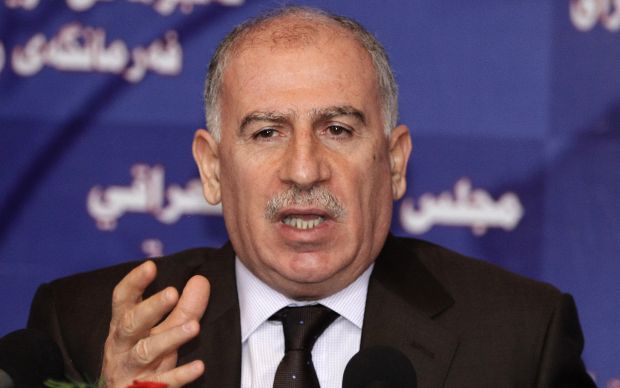
Iraq’s Parliament Speaker Osama Al-Nujaifi speaks to the media in Baghdad, Iraq, on July 25, 2013. (AP)
Baghdad, Asharq Al-Awsat—The Sunni Mutahidoun Coalition, led by Iraqi Parliamentary Speaker Osama Al-Nujaifi, has announced that it will not return to parliament unless an emergency parliamentary session is called to discuss and resolve the Anbar crisis.
Iraqi forces have been besieging Islamic State of Iraq and Syria (ISIS) fighters in the western Iraqi governorate for weeks, with the country’s Sunni and Shi’ite communities trading accusations regarding who is responsible for the violence and just what is taking place in Anbar. At least 140,000 people have fled the governorate since the outbreak of violence, according to a recent UNHCR report.
In a statement by Mutahidoun Coalition spokesman Zafer Al-Ani, he affirmed that the Sunni-dominated political bloc “holds all national political leaders responsible for the direct damage inflicted on our homeland and people.” He urged Iraq’s political leadership to “avert the potential catastrophic risks it is taking by acting responsibly and collectively and holding an emergency meeting is held to address the deteriorating security situation in Anbar.”
“The crisis in Anbar threatens more risks and what Iraq’s national leadership has to realize is that the crisis will not be confined to this province, but will extend to engulf not just Iraq but the entire region,” the statement added.
In comments to Asharq Al-Awsat, Mutahidoun Coalition MP Talal Al-Zawba’i asked: “How can we think of returning [to parliament] while the military continues to build up its forces in Ramadi and Fallujah?” He also said the government’s military operations in Anbar were “illegal and unconstitutional.”
“Returning to parliament is not an important option when compared to the suffering of our people in western Iraq, and securing their safety is more important than any laws that parliament wants to implement,” Zawba’i added.
He called for parliament to take a stronger line on the Anbar crisis, adding that “major military operations must be subject to national consensus through the parliament,” saying that “dialogue is the correct approach to resolve the situation.”
But Ali Al-Shallah, a member of Iraqi Prime Minister Nouri Al-Maliki’s State of Law Coalition, criticized the Mutahidoun’s anti-government discourse, accusing the Sunni bloc of “ignoring the presence of ISIS in Anbar.”
Speaking to Asharq Al-Awsat in Baghdad, Shallah questioned the Sunni bloc’s stance on the ongoing Anbar crisis, saying that it “holds the government solely responsible while it turns a blind eye to the crimes being committed by ISIS against the people of Anbar.”
“The proper approach to finding a solution lies in publicly admitting the presence of terrorism and ISIS in Fallujah, and the people of Fallujah and Anbar have already done this,” he added.
